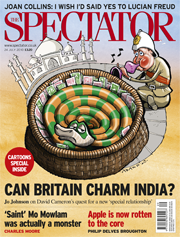 The new edition of The Spectator is out, and I thought CoffeeHousers may appreciate a
rundown of what’s in it.
The new edition of The Spectator is out, and I thought CoffeeHousers may appreciate a
rundown of what’s in it.
1) Cameron, the accidental radical. James Forsyth’s political column is, as always, choc full of original insights and insider info. James explains how this coalition is far more reforming than anything Tony Blair led – yet the weird thing is that, whereas Blair would talk with evangelical zeal, Cameron says almost nothing. At times, it’s almost like he has no idea about how radical his government has become. James reveals how Clegg has become an ally for IDS on welfare reform. James also mentions that the reformers in all three parties would sometimes meet, and muse about how they had more in common with each other than the state-control fetishists (the Brownites, the Tory patricians, the leftie LibDems). It’s a piece which helps you make a lot more sense of the evolving nature of this government.
2) Forget America. The ‘special relationship’ that Cameron wants is with India. This is a must-read piece for anyone trying to assess the foreign policy priorities of this government, ahead of Cameron’s trip there next week. Jo Johnson was the FT’s bureau chief in New Delhi between 2005-08 – he’s now an MP for Orpington and has written his first cover piece for the magazine his brother once edited. No one is better clued in to both the thinking in New Delhi and how the Cameroons want to shift their global alliances. It is, he says, absurd that we still give aid to India when it has a nuclear programme, a space programme and a foreign aid programme of its own. Britain may now love India – but are they really into us? It seems not. Christian Adams’ cover piece shows Cameron trying in vain to charm the Indian snake. Our relationship with India is really out of date: DFID love to see it as an impoverished aid recipient, yet Cameron and Vince Cable will be there begging for India’s money. Jo’s piece is the best primer you’ll read on this fascinating and fast-evolving relationship.
3) Leading article. The danger of turning a blind eye to the EU. To paraphrase Trotsky, Cameron may not be interested in the EU – but Brussels is very interested in Britain. Cameron’s dearest wish for the EU is that it goes way. He fears that the subject turns his party a little bit mad, but now he’s running a coalition he has even more reason not to want to let any EU subject arise. This silence suits the European Commission perfectly – it grabs power by stealth. To accrue more powers, it needs nation states to do nothing. An example is coming in the form of the European Investigation Order, which Dominic Raab has raised in parliament, to which minsters have not replied. If we opt in (which we may do, the Home Office is saying nothing about it) then EU police officers will effectively have the power to instruct British ones. It’s a major change. That, together with the hedge fund and financial regulation, means Brussels’ power over Britain is getting greater all the time. Some 51percent of the population think our membership of the EU is a negative thinG – this is not a fringe argument. If ministers won’t ask what’s going on with Europe, then the MPs must. The public is not happy about all this, and the role of parliament is to project, not muffle, their discontent.
These are just three. We have Charles Moore writing from Belfast on why Mo Mowlam was not the saint she’s portrayed as being. We look at why Apple is rotten, why daytime TV is oddly therapeutic and the inimitable Theodore Dalrymple, a former prison doctor, on why prison works. This PLUS the best books section in Britain, edited by Mark Amory (we had some drinks in the garden last night to celebrate his 25th anniversary as Literary Editor).
CORRECTION: I stand corrected – Jo Johnson wrote a cover piece seven years ago, when the magazine was edited by a certain figure in local government.







Comments